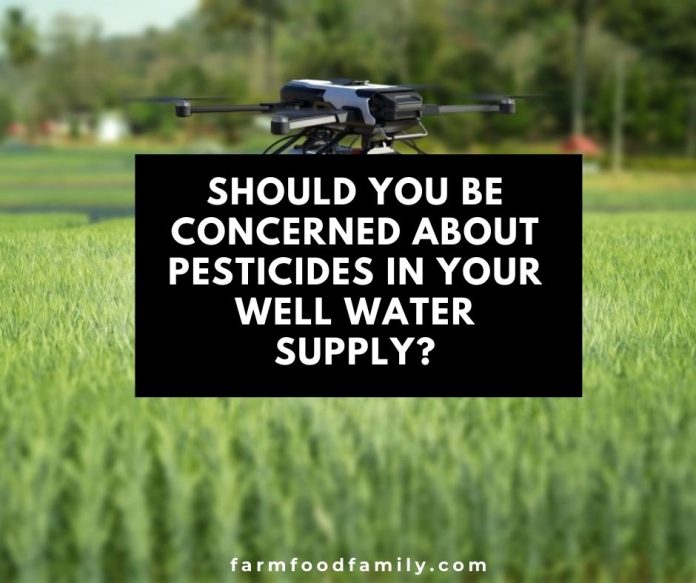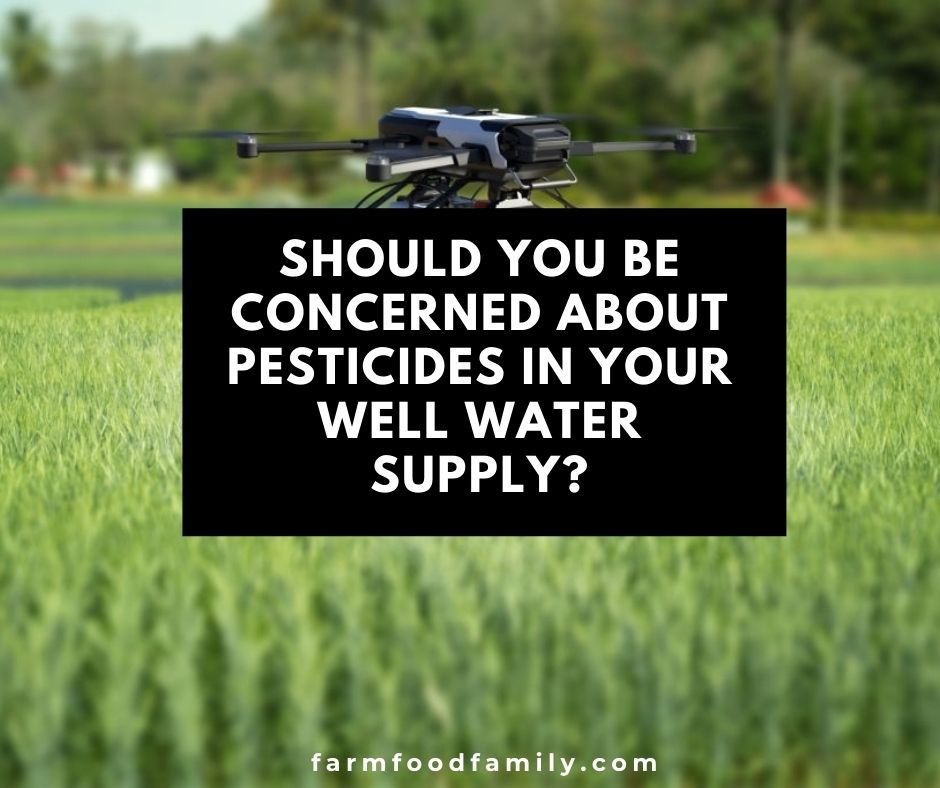
Your well water, like water from any other source, can get contaminated with substances that are harmful to your health.
These contaminants range from those noticeably changing the appearance of water, making it easy for you to tell that it’s unsafe to drink, to those that leave no obvious signs.
Pesticides belong to the category of contaminants that cause no visible change to your well water supply, especially when not found in excess amounts.
What Are Pesticides and How Do They Get Into Your Well Water?

Pesticides are chemicals used on farmlands to control and prevent plant and animal infestation. These chemicals could be herbicides used to control weeds or insecticides and fungicides used to control insects and molds, respectively.
Pesticides remain present in the soil long after farmers have used them. They later find their way into your well water as agricultural runoff due to either irrigation or rainfall.
Some of these pesticides are made from non-biodegradable chemicals, meaning they will remain in groundwater for a long time. Some of the more offensive pesticides may get banned after a while, but even years after their ban, they can still be found in well water. An example of this is Dichlorodiphenyltrichloroethane, commonly known as DDT.
This problem of pesticides in water is widespread in rural areas. Unlike urban areas, most rural areas have no public water supply, and they have to dig up their own private wells. Agricultural activities are also practiced more in rural areas, and the pesticides used in farms seep into private wells as agricultural runoff.
Health Effects of Pesticides in Well Water
All pesticides are harmful to your health in one way or another, but the degree of harm a pesticide can cause depends on its type and the period of exposure. Basically, the longer you’re exposed to pesticides, the greater the health threat.
Most pesticides used in agricultural practices are organophosphorus compounds. They are highly toxic and cause various nervous disorders when ingested. On the bright side, organophosphate compounds are easily degraded, so they rarely get into well water.
Carbamate pesticides, on the other hand, are highly soluble in water and not easily degraded. You are more likely to be affected by carbamate pesticides than organophosphates because of their constant presence in groundwater. They also cause nervous disorders and are carcinogenic.
Symptoms of acute pesticide poisoning include dizziness, headaches, stomach cramps, skin and eye irritation, convulsion, and heart attacks.

How Do I Test For Pesticides in My Well Water?
Now fully aware of the possible health implications of pesticide-infested waters, the next step is to get your well water tested to ensure that it’s free of pesticides.
If you are a homeowner with a private well, chances are you take full responsibility for your well quality and safety. If you’d like to test your well water for pesticides and you’re not sure how to go about it, you should consider:
The Age and Depth of the Well
An old well is more likely to have pesticides than a well dug more recently. Old wells will also have more pesticides because they have gathered inside and accumulated over time.
A deep well will also have more agricultural pesticides seeping into it than a shallow one. If you have an old or really deep well in a rural area, you should consider getting your well water tested.
Proximity to Agricultural Fields
If your well is located close to farmlands, you should get your water tested no matter what. You can also make a quick inquiry on the type of pesticides used on the farm. This will help you to run a more specific test.
Presence of Nitrates
Nitrates are an essential part of many pesticides. Finding high amounts of nitrates in your water might mean that you’re dealing with pesticide contamination. If your water quality test reveals the presence of nitrates, it would mean that you have to do an additional test to confirm the presence of pesticides.
Running pesticide tests on your well water can be expensive, so it’s important that you consider the options listed in this article before carrying out any testing. This could save you time, money, and effort.
If your well water falls into any of the categories listed, take your well water samples to the lab to confirm the presence or absence of pesticides.
What Do You Do If Pesticides Are Present in Your Well Water?
You have confirmed the presence of pesticides in your well water. Should you be concerned?
Truthfully, Yes.
But don’t panic! There are various water treatment options available for your well water. These treatments will remove the pesticides present, leaving you with water safe and fit for home use. Here are some common well water treatment options:
Reverse Osmosis (RO) Systems

Reverse osmosis systems filter off pesticides by pushing water through a semipermeable membrane. This membrane allows water molecules to pass through but stops larger molecules such as pesticides from passing.
RO systems are point-of-use systems, and they can be installed at various water outlets in your home, like the taps or showers in your bathroom. With an RO system in place, you never have to worry about pesticide contamination.
Whole House Well Water Filters
Whole house well water filters purify your water before distributing it to the many outlets in your home. They are installed at a specific point in the plumbing to ensure that your well water is fully treated before getting drawn into your home.
Whole house filtration systems remove contaminants like debris, heavy metals, and chlorine. You may need to do more research before choosing a whole house well water filter targeting pesticides.
Granular Activated Carbon (GAC) Filters
These are relatively cheap point-of-use or point-of-entry filters. The pesticides in your well water adhere to the carbon granules and are thus removed from the water. GAC filters require regular replacement to keep them working efficiently.
Conclusion: Pesticide Contamination Is a Great Concern
Pesticides are one of the most common substances in the agricultural industry that adversely affect human health. So if your home water comes from a private well, then pesticide contamination should be of great concern to you.











